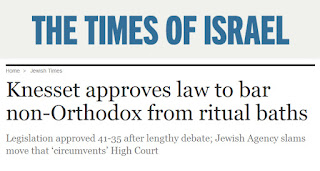The Other-Siders: On being a Hebrew - Torah portion Miketz

Joseph's brothers are asked to dine at his house. The Egyptians in Joseph's house eat separately, and the Torah tells us why: "The Egyptians could not eat bread with the Hebrews, because it was abhorrent to the Egyptians." (Gen 43:32) What was abhorrent about it? We find out later that shepherds are abhorrent to the Egyptians (46:34). Commentators such as Rashi say that this is because the animals being shepherded and eaten by the Hebrews - sheep and bulls - are Egyptian gods. However, we have evidence that at least some subset of Egyptians ate beef and mutton , and the Torah itself speaks about Pharaoh (i.e. the Kingdom of Egypt) possessing livestock (47:6). So there may be more to this issue than meets the eye, and I think I'll leave it to the Egyptologists and other scholars to sort that one out. At any rate, the Torah describes a taboo among Egyptians against co-mingling with Hebrews. The Hebrew experience, at least in Egypt, is decidedly that of the ...




